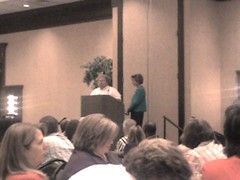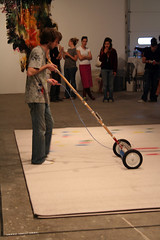I’m in the back of the room, with the electricity — though the buzz throughout this conference center hall indicates an electricity of anticipation. Will Richardson is known by all. It’s the magic of blogging that so many can become so famous by publishing. He, of course, deserves all of the notoriety, which he uses skillfully to press forward a case for retooling education, what we teach and how we teach it.
It’s not an all together comfortable place to be. I’m back against the wall, but there is just enough room for people to across in front of me getting from one part of the hall to another, and they keep stepping on my feet.
Oh! The referees have just marched in blowing — were those whistles? Great fun! The theme is taking it to the net. Think UNC, NC States, and Duke. They’re all no more than a basketball’s toss from where we are right now.
Will tells me that I’ve seen all of his…
just a sec. A member of the Science & Technology Committee in the North Carolina House of Representatives. She’s actually staying for the entire conference.
 |
| Will has them spell-bound!
|
Anyway, Will says I’ve seen everything in his keynote before. Well, I’ll be the judge of that over the next hour. So comments and commentary follow…
Will has already been coached by the young man who introduced him and by me to talk slowly, because he’s down south. We like to savor our words. Will’s wiki handouts are at:
http://willrichardson.wikispaces.com/
An emerging theme of his speech is that the world of our children is dramatically different from the world we grew up in (1950s and ’60s in my case). It’s the YouTube generation. We are watching the YouTube presidential campaign. It’s about learning. Will Richardson is a learner, and he learns through his blog. Everyone he interacts with, who reads his blog, who blogs about his blog, who comments on what he’s written — is a potential teacher for him …and they come to his blog because they believe that he is a potential teachers for them.
Kids understand this in a personal way. They do not understand it as a life-long learning skill. It’s a personal living skill. MySpace is where they go to learn, and it is not going away. Will pulls up a MySpace account maintained by a young woman, and it is very much a glamor site — highly suggestive images. Will compellingly makes the case that this young woman has put an enormous amount of time into maintaining her site. Several educators are murmuring about the dangers and how she is making inapproproate use of her site. I want to say, “She’s expressing herself exactly the way that our culture has taught her to express herself.” Just watch TV!
Good Point! Certainly some of what is available on the Wikipedia is not correct. We don’t know how much, though studies indicated that the Wikipedia is amazingly accurate. But — compare this with the probably percentage of what we teach today, that will not be accurate ten — or five — years from now. We, educators, are swimming in a wikipedia style of curriculum, foundering in an ocean of rapidly changing times
Another good point! Many kids are now doing their work in blogs and wikis. They have readers and commenters. They are engaged in conversations about their work. They are invested in their work. The rest of our children work on work sheets that are seen only by their teachers. They have nothing invested in those pieces of paper.
An outstanding introduction to this 2007 NCAECT Conference…
 I ran into this very thoughtful post (Talking to Administrators about Podcasting) by Dan Schmit about podcasting in schools. I’m including excerpts here with my comments, but please go read his original post and take a look at his new book,
I ran into this very thoughtful post (Talking to Administrators about Podcasting) by Dan Schmit about podcasting in schools. I’m including excerpts here with my comments, but please go read his original post and take a look at his new book, 
 The closing keynote was done by that high energy pair, Michigan educator, Elliot Soloway and Texas educator, Cathleen Norris. Now there is a likely pair, Elliot without a tie, without a jacket, hair aflame and eyes on fire, and Cathie, with business suit, well groomed, and calm, until she gets started. What they have in common is E N E R G Y and an equal degree of passion for learning with technology. They are promoting handheld computers in the classroom, and although there is a certain amount of logic to their arguments, and I learned a lot from their E N E R G E T I C presentation, I remain unconvinced that this is the only way — I can certainly be wrong.
The closing keynote was done by that high energy pair, Michigan educator, Elliot Soloway and Texas educator, Cathleen Norris. Now there is a likely pair, Elliot without a tie, without a jacket, hair aflame and eyes on fire, and Cathie, with business suit, well groomed, and calm, until she gets started. What they have in common is E N E R G Y and an equal degree of passion for learning with technology. They are promoting handheld computers in the classroom, and although there is a certain amount of logic to their arguments, and I learned a lot from their E N E R G E T I C presentation, I remain unconvinced that this is the only way — I can certainly be wrong.

 First, “It’s great to be home,” and it is hard to reconcile being in Minneapolis earlier this week, with sub-zero wind chills, and today, here in Raleigh, where it’s almost warm. Here are some blooming daffodils from our garden. During my walk with the dog this morning I actually saw some azaleas starting to bloom. Unreal!
First, “It’s great to be home,” and it is hard to reconcile being in Minneapolis earlier this week, with sub-zero wind chills, and today, here in Raleigh, where it’s almost warm. Here are some blooming daffodils from our garden. During my walk with the dog this morning I actually saw some azaleas starting to bloom. Unreal!